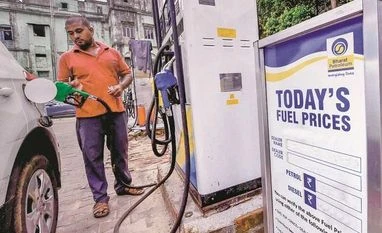Loss on petrol ends; continue to incur loss on diesel sales: BPCL chairman
A moderation in international oil prices has helped Indian fuel retailers to break even on petrol and domestic cooking gas LPG but they continue to lose money on diesel
)
Bharat Petroleum
A moderation in international oil prices has helped Indian fuel retailers to break even on petrol and domestic cooking gas LPG but they continue to lose money on diesel, the most used fuel in the country, an official said on Monday.
State-owned fuel retailers Indian Oil Corporation (IOC), Bharat Petroleum Corporation Ltd (BPCL) and Hindustan Petroleum Corporation Ltd (HPCL) did not raise petrol and diesel prices for almost five months now despite rising international oil prices.
This is because international oil prices were highly volatile, rising or falling by USD 5-7 per barrel on a single day, BPCL chairman and managing director Arun Kumar Singh told reporters.
"Our ability to pass on this kind of volatility is simply not there. No marketer can transfer this kind of volatility," he said, adding, "It is our deep desire to absorb volatility. We don't pass on sharp increase or fall in prices."
And so the oil companies decided to absorb "some losses with hope that we can make up for these losses later," he said.
At one point, the fuel retailers were losing Rs 20-25 per litre on diesel and Rs 14-18 a litre on petrol as international oil prices soared. These losses have been trimmed with the fall in oil prices.
Also Read
"Next month onwards there will be no losses on LPG. We don't have any losses on gasoline (petrol) today," he said, adding that there, however, are some losses on diesel.
IOC, BPCL and HPCL are supposed to revise the retail price of petrol and diesel daily in line with cost. But they froze rates for a record 137 days beginning November 4, 2021, just as states like Uttar Pradesh went to polls.
That freeze ended on March 22 this year and rates went up by Rs 10 per litre each in just over a fortnight before a new freeze came into effect from April 7.
Currently, petrol costs Rs 96.72 a litre and diesel Rs 89.62 per litre in the national capital. This came down from Rs 105.41 a litre price on April 6 for petrol and Rs 96.67 a litre for diesel as the government cut excise duty to cool rates.
The Rs 10-a-litre increase, effected between March 22 to April 6, was not sufficient to cover the cost and the new freeze meant the accumulation of more losses.
"I believe this is a temporary phase. The world cannot afford this kind of prices for long," Singh said.
But if the prices stay higher for long then "some intervention either way of price increases or some compensation, a grant from the government will be needed," he said.
He did not provide details about how much losses oil companies are making.
Oil companies did not revise rates to help the government manage inflation which had already peaked to a multi-year high. It would have further spiked if petrol and diesel prices were increased in line with cost.
But the freeze meant that the three retailers post a combined net loss of Rs 18,480 crore in the June quarter.
Petrol was deregulated in June 2010 and diesel in November 2014. Since then, the government does not pay oil firms any subsidy to compensate them for losses they might incur on selling fuel at rates below cost.
Russia's invasion of Ukraine in February sent shock waves through global energy markets. Initial price spikes turned into lingering price rises as the global community imposed sanctions on Russia's key exports. Brent was at USD 90.21 per barrel before the invasion and rose to a 14-year high of USD 140 each barrel on March 6.
Some of the heat has come out of oil markets in recent weeks on fears of a recession snipping away demand.
The basket of crude oil that India imports averaged USD 99.60 per barrel on August 26, an official data showed.
It had averaged USD 102.97 per barrel in April, before rising to USD 109.51 in the following month and USD 116.01 in June.
Prices started to fall in July when the Indian basket averaged USD 105.49 a barrel. It averaged USD 97.15 in August.
Singh said oil prices will have to fall substantially before a reduction in retail prices can be seen in India.
(Only the headline and picture of this report may have been reworked by the Business Standard staff; the rest of the content is auto-generated from a syndicated feed.)
More From This Section
Don't miss the most important news and views of the day. Get them on our Telegram channel
First Published: Aug 29 2022 | 10:49 PM IST


